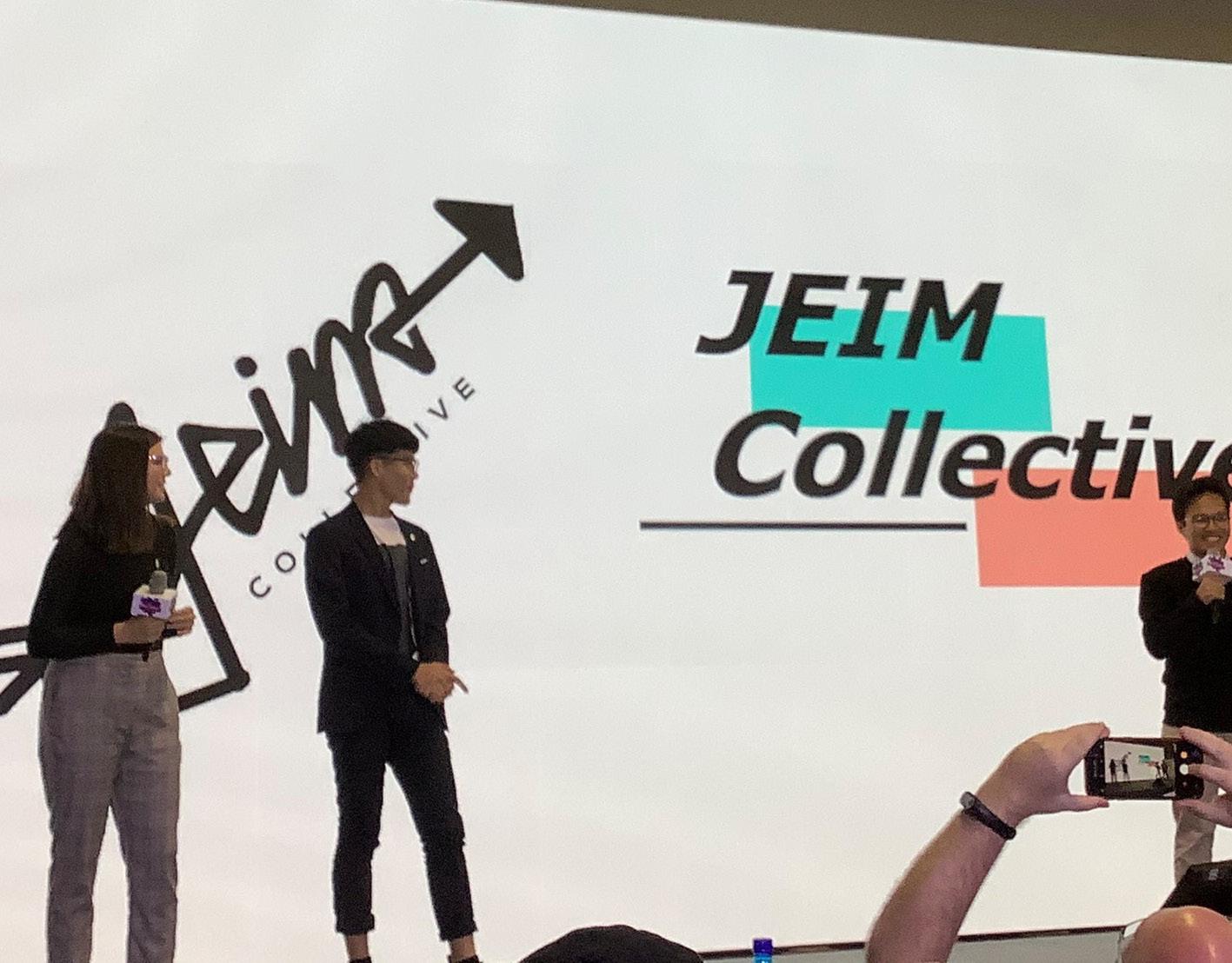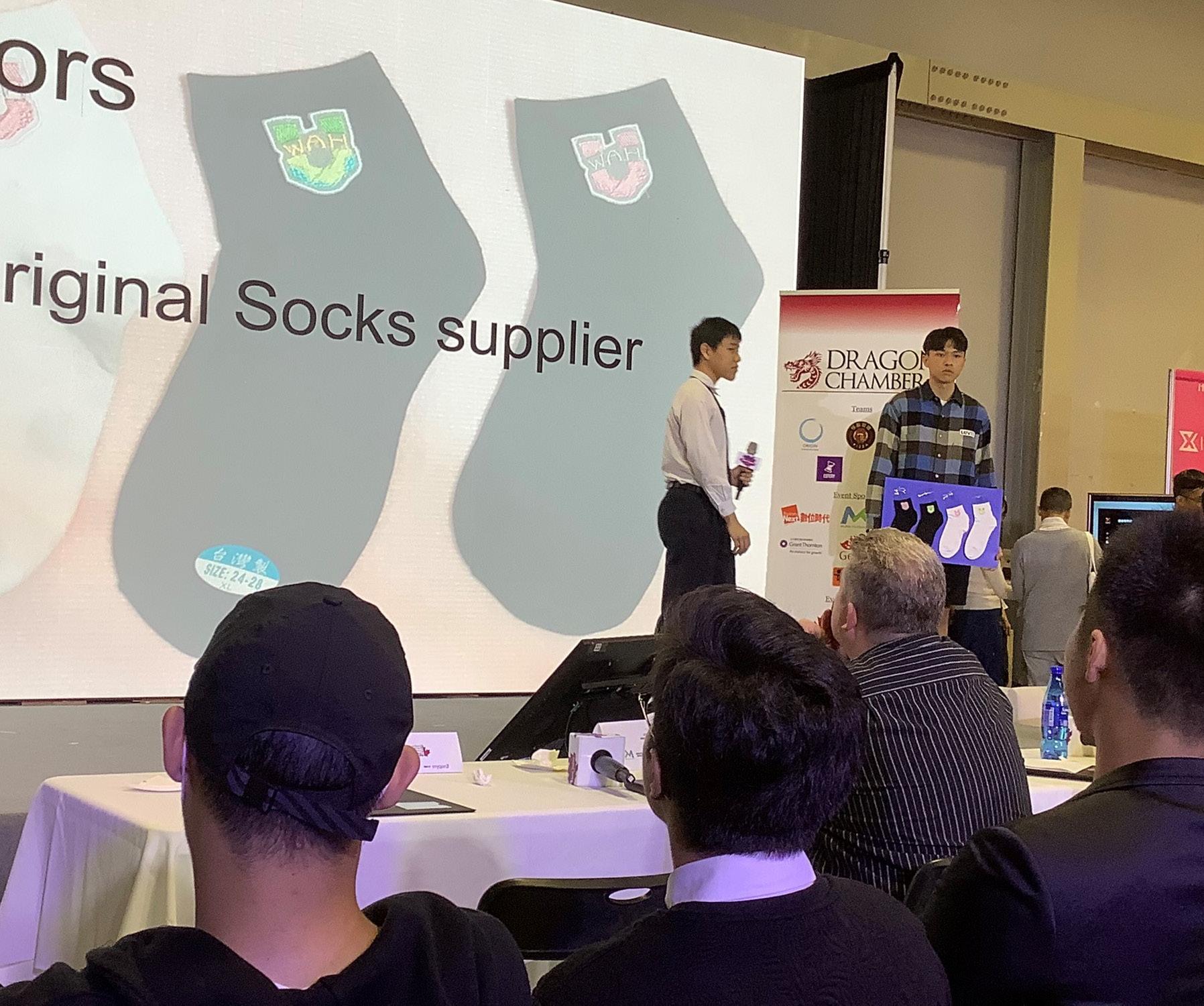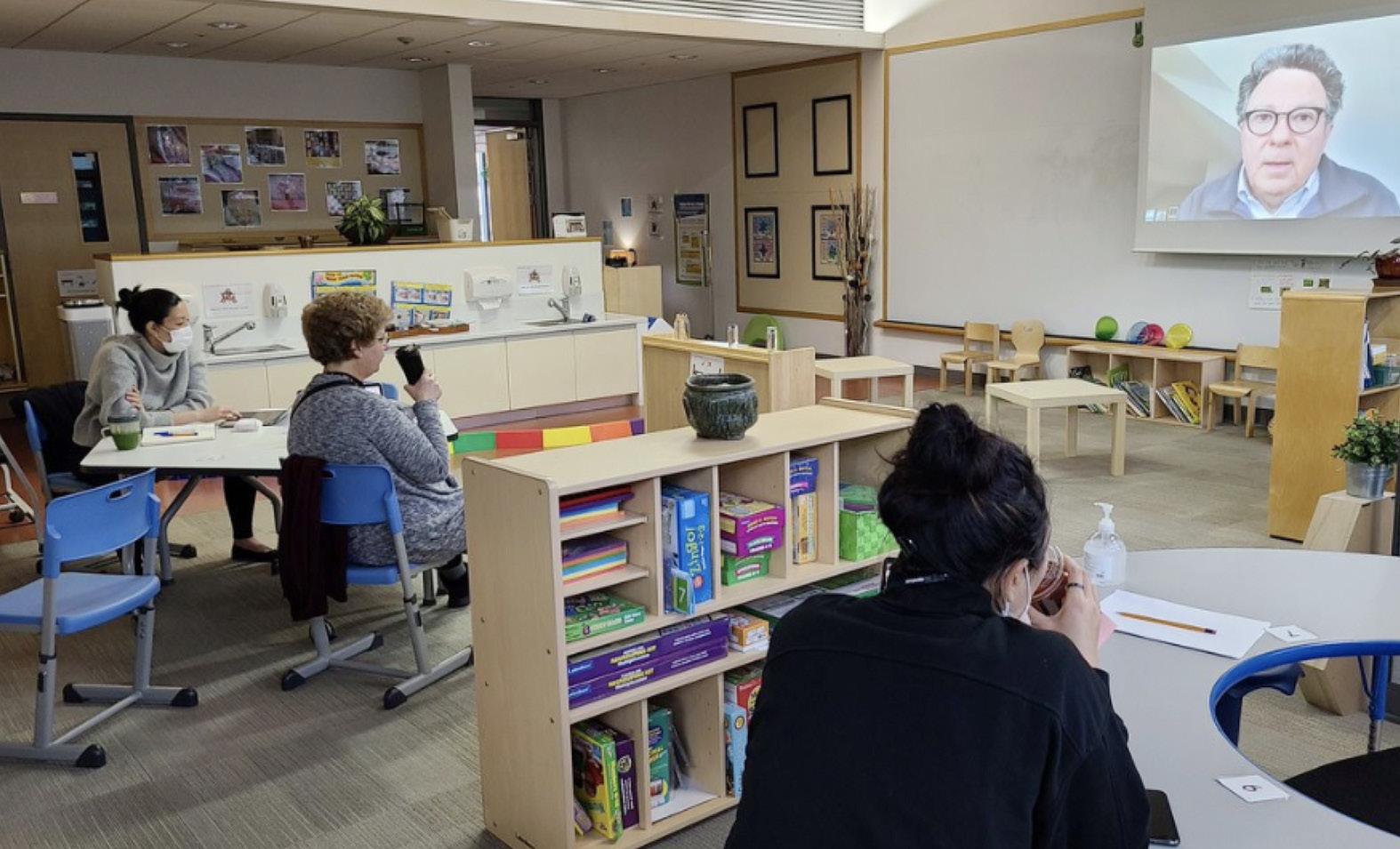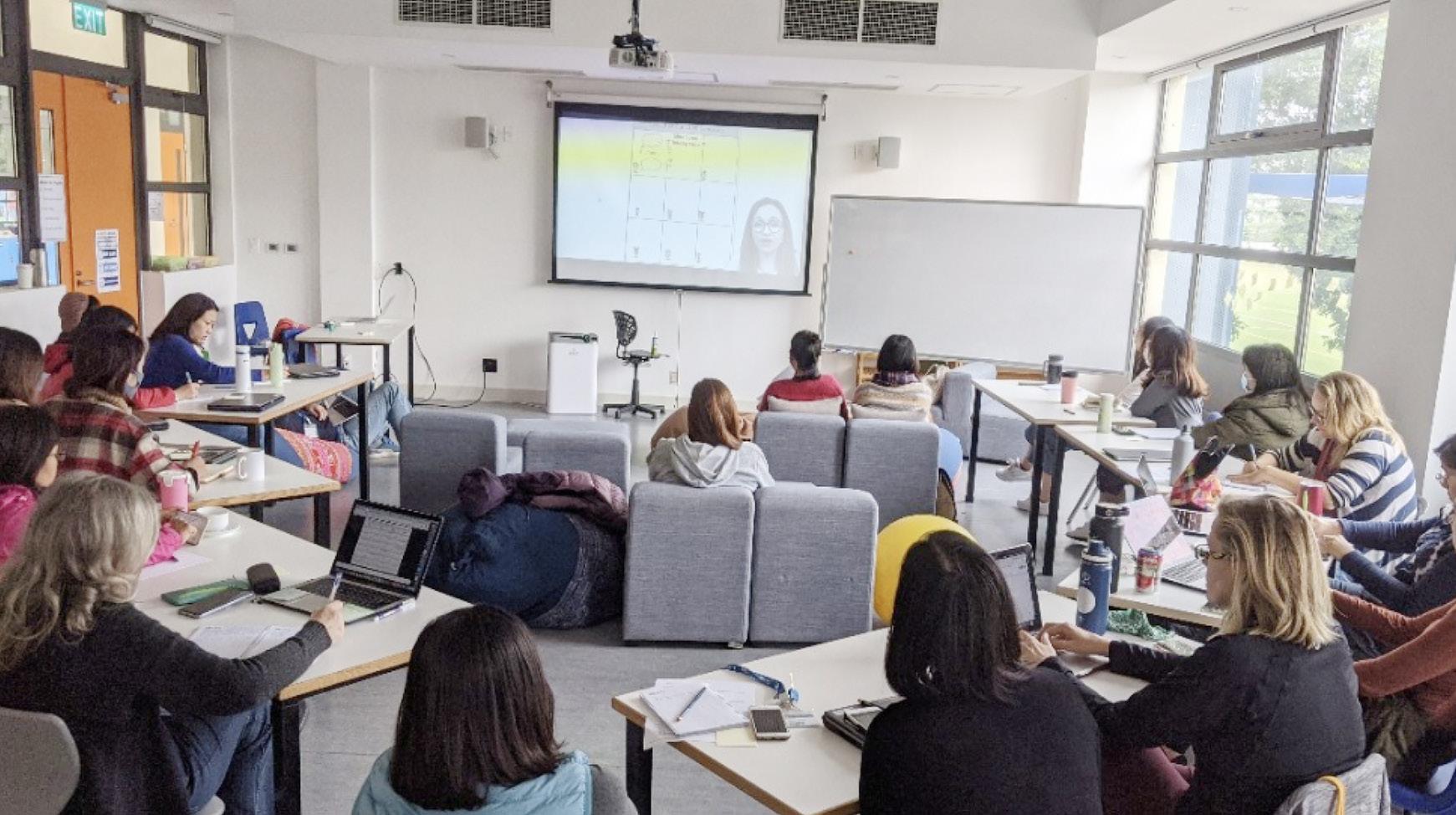
13 minute read
Griffith Library Reopening Ceremony (RISM) Project Based Learning
PROJECT BASED LEARNING 21st Century Project Based Learning for Generation Z
By Mercia de Souza Dominican International School, Taipei
When two High School entrepreneur groups from Dominican International School, Taipei (DIS) participated in finals of Taipei’s Dragon’s Chamber 2019 competition, it was a further step forward in the development of 21st Century project Based Learning in its fourth experimental year at the school.
In this annual event finalists pitch their businesses to long-term, established expatriate entrepreneurs in Taipei. The organizers gave two of the school’s student businesses the opportunity to pitch their businesses to showcase the Dragon’s Chamber organizers’ commitment to the training of young entrepreneurs for the past three years. The young entrepreneurs are Grade 12 students who are running real start-up businesses as a school subject.
Entrepreneurship is part of Dominican International School’s 21st Century Project Based Learning. After extensive research into the merits and methodology of 21st Century PBL, the writer of this article started the new subject for Grade 12 students three years ago. The Buck Institute for Education in the US is a leading organization in the field of PBL. They describe it as “… a teaching method in which students gain knowledge and skills by working for an extended period of time to investigate and respond to an authentic, engaging, and complex question, problem, or challenge” The Dominican International School PBL program was initially based on their framework for PBL course development.
21st Century Project Based Learning teaches Generation Z students critical survival skills for the 21st century. There are many descriptions of these essential skills, but the 4Cs are the ones most widely accepted - critical thinking, creativity, collaboration and communication. Students learn from their own project research; they are not taught any facts. Usually, teachers provide readings, worksheets and other forms of information before students do a project, but 21st Century PBL is different, students do not just apply what they have learned from a teacher, they learn the material from completing the project. Students take responsibility for their own learning, because the teacher becomes a facilitator.
Students learn how to solve problems and how to think beyond the box. They learn to work together to achieve a common goal and to communicate in such a way that they convey their ideas clearly. No more fact regurgitation as they learn to think critically, learn problem solving skills, learn to manage their time and learn to be organized. Furthermore, they have to do teamwork – just as in the real world of work. They learn communication skills, because they have to do regular presentations about their progress to their peers and teacher. The DIS students also have to pitch their businesses to the judges for the Dragon’s Chamber competition in a first round. Not all of them present in the final event, they are competitors like every other entrepreneur team in the competition.
Students’ creativity is enhanced as they find new ways to grow their businesses. An example of the students’ creativity is the way in which the DIS entrepreneurs coped with the new challenges of the COVID-19 pandemic. They moved their businesses online, some even brought about new product ranges, and the income and expenditure statements looked very healthy at the end of the 2019/20 school year.
Community involvement is important. Students create a public product, which means that they present or display their work to an audience beyond the classroom. For this to be successful, community members share what they know with students – for example, guest speakers, project consultants and other community members who are willing to give of their time and expertise. The 2019/20 students were featured in a radio talk as inspiration for other young entrepreneurs.
The school teams up with outside partners to help students create a public product with the help of established and well-known Taipei entrepreneurs. This means that students present their work to an audience beyond the classroom and get input from people with the expertise to guide them. The student entrepreneurs run real businesses and the successful ones step away with well-earned profits at the end of the school year. Some of these young entrepreneurs even went on to partially fund their university education from their own start-ups after leaving school.
Three years ago Dominican International School student entrepreneurs pitched their businesses for the first time to the “dragons” in the first elimination round of the Dragon’s Chamber hoping to eventually get into the final. The organizers of the event have supported the young entrepreneurs ever since and every year, they participate in the first elimination round of The Dragon’s Chamber. There they learn what the world away from the school’s protection has in store when they get very frank assessments of their businesses. Teachers try not to be judgemental and to encourage the students as much as possible, but the “dragons” live up to their name; here is some feedback from students who participated: • “Dragon’s Chamber allowed us to understand what we are facing when we are starting up our own company” • “The Dragons’ Chamber experience showed me just how brutal the business world is” • “The Dragon’s Chamber made the business world real for me.“ • “The Dragon’s Chamber was my best experience this year.“
During the 2019/20 school year, the organizers gave the two most promising high school businesses the chance to showcase what they were doing, and to show the support the Dragon’s Chamber organizers give the school and the young entrepreneurs in Taipei. This gave them the opportunity to find investment, or to do business-to-business trade. One group had very lucrative dealings with businesses they met at the Dragon’s Chamber final event that boosted the bottom line of their income and expenditure statement.
The school hopes to showcase the students’ entrepreneurship skills again, even if it has to be virtually, because of the current pandemic.
Elias Ek, one of Taipei’s best known expatriate entrepreneurs and the author of “How to Start a Business in Taiwan” is one of the school’s esteemed and stalwart supporters of the Entrepreneurship project. He knows how to identify with the young entrepreneurs and how to inspire them, because he started his first business at the age of fifteen. The students feel that they are given real advice and they act on the recommendations of the business people present during their initial pitch. Jessie Hung, one of the main organizers of the 2019 Dragon’s Chamber and a successful entrepreneur herself, has also been a student supporter for the past three years. She is always ready to share valuable ideas with them, and to give much needed advice.
Assessment is important, but students do not get assessed on their profits or sales. They get assessed on how well they develop their businesses and how they interact as business partners to make a success of their venture. The progress is assessed through a series of benchmarks that their teacher-facilitator gives them and how they achieve those benchmarks. Examples are their product development, their marketing plan, and the development of their bookkeeping system. They also have an opportunity for regular peer assessment of their business partners’ contribution to the project. Peer assessment makes up a substantial portion of the grade they achieve for the subject. Assessment is done on a series of rubrics especially designed to evaluate every one of the benchmarks and how they achieve them.
21st Century PBL is exciting methodology that correlates with the research about Generation Z. Several studies found that they were are self-sufficient, entrepreneurial, prefer peer-based information, and want hands-on experience. Entrepreneurship fits into these needs and enhances the learning of a new generation of 21st century students. Dragon’s Chamber final



In Memoriam
Daw Khine (Hla Hnin Khine), the founder, the chair of the Board, and the heart and soul of the International School of Myanmar (ISM), passed away earlier this year. Until her final weeks, Daw Khine was present every day at ISM leading the way to keep a supportive environment for both students and staff. She also represented ISM at many international conferences.
Daw Khine grew up during the post-colonial times in Myanmar (Burma), and she was educated at a Catholic school. However, there was a decline in the education system in the country, which she experienced as a teacher during her early career and again during the elementary schooling of her granddaughter. Twenty one years ago, Daw Khine founded ISM for her granddaughters and other children in the country to get a high quality well-rounded international education. Today, her legacy is the school she envisioned. ISM remains true to Daw Khine’s vision of educating hundreds of Burmese students who will do their part in shaping the future of Myanmar and positively contributing to the global community.
CURRICULUM Getting the Full Picture Data-Driven Decision Making in Creating the International School of Busan Tech Plan
When I joined the International School of Busan (ISB) this year as the whole school Technology and Learning Innovation Coordinator, my director tasked me with a deceptively simple list of jobs for my first few months; 1 - get to know the students and teachers, 2 - figure out how things work around school, and 3 - put together a plan for how we might move forward with educational technology at our school.

I spent my first weeks at the school visiting classrooms, chatting with students and teachers about their learning and working hand-in-hand with our lead systems engineer to fully wrap my head around all of the moving pieces that bring an ISB school day together. Tasks 1 and 2 went smoothly and I was feeling confident. But when it came to task 3, I felt like I was standing at the base of a huge mountain staring up, knowing I had yet to take the first step up.
How could I make a plan to move forward if I didn’t know what students and teachers were currently capable of? How could I suggest strategies that both met the demands of the 21st century and honoured the spirit of the IB programme? Furthermore, how could I hear from each member of our community and get their individual perspectives on what tools and methods they think we should adopt as a school. After all, they are going to be the ones on the receiving end of all of this!
It was clear we needed some data. The Learning Innovation team came together and with lots of input from teachers and administrators, wrote the 2020 ISB Technology Skills Survey. This was a one-stop-shop streamed Google Form that would collect data from everyone at ISB around their use of and perspectives on educational technology in one single place. We were ready to roll! Over one week in November, we surveyed almost our entire community! We asked three simple questions; where are your skills at, how are you using technology to transform your learning and how do you envision the future of learning at our school?
In order to make sure what we were getting back was accurate, each of these questions was broken down into highly specific subsections that focused on hard technology skills (i.e. file management, digital literacy, keyboarding and browsing practices), the ISTE standards for students and educators and an open-ended response section.
After a whole lot of data cleansing and a little magic with Google Data Studio, the results were ready to be shared. We created a series of interactive dashboards that allow the whole community to explore the data for themselves and see both the macro-level trends or drill down into specific groups/skills for a more granular view of educational technology at our school.
Like everything in life, hindsight is 20/20 and there are certainly some suggestions I would give other tech leaders who are considering similar initiatives at their school. But this big endeavour has been an awesome project for getting to know the amazing learning community here at ISB, and more importantly, it has produced a wealth of valuable data to draw upon when it comes to making informed decisions about our future!

International School Busan Technology Skills Survey Hard Technology Skills - Students (bit.ly/ISBtech1) Hard Technology Skills - Teachers/Administrators (bit.ly/ISBtech2) ISTE Standards - Whole School (bit.ly/ISBtech3) Parent Perspectives (bit.ly/ISBtech4) Qualitative Feedback - Whole School (bit.ly/ISBtech5)
SENIA CONFERENCE SENIA 2020 Virtual Conference: Bridging the Gap
By Lori Boll, Executive Director Special Education Network and Inclusion Association(SENIA) www.seniainternational.org
SENIA members were extremely disappointed when their regularly scheduled conference was canceled last February due to COVID-19 concerns. Optimistic that the pandemic would soon be over, members of the SENIA board and Chadwick International School began planning for a new conference to be held from December 4-6 in Korea. COVID had other plans.
According to Kate Balsamo, SENIA Chairperson, “The global pandemic altered the paths of many conferences worldwide, and SENIA was no exception. While we all hoped to travel to Chadwick International school for this year’s annual SENIA conference, country restrictions and travel bans forced the shift to a virtual platform. The SENIA Board, under Lori Boll’s direction, built an amazing conference that attracted close to 900 participants from some 37 countries around the globe! The initial benefit of using a virtual platform was access to educational leaders in the field of special education, but many more benefits emerged. Participants enjoyed the asynchronous learning that allowed choice as they built their personal learning plans. Furthermore, since the keynotes and workshop sessions were recorded, participants had access to the information throughout the month of December. This allowed for small groups to gather and watch (or rewatch!) sessions together.”
This year, SENIA participants were treated to keynotes from exceptional professionals including author, psychologist, and founder of Lives in the Balance Dr. Ross Greene, inclusion advocates Norman Kunc and Emma VanDerKlift, and well-known expert on Executive Functioning, Sarah Ward.
Other speakers of note included Jessica Minahan, author of The Behavior Code: A Practical Guide to Understanding and Teaching the Most Challenging Students, Jon Nordmeyer, Bonnie Singer, Dr. Ann Helmus, and Dr. Roby Marcou to name a few. In the end, we had 23 presentations that supported teachers, parents, and professionals in the areas of behavior, communication, autism, and best practices.
A unique aspect of this virtual conference is that it allowed large school groups to attend and learn best practices together. Many schools took advantage of this including International School Manila who sent more than 60 educators and Jakarta Intercultural School which had 78! Schools learning together and adopting inclusive practices is something special.
SENIA local chapters had watch parties (where permitted) so our members were still able to network. Best expressed by Kate Balsamo, “The heart of a SENIA Conference is networking and connections, and be it through community chats and meetups on Whova, or in-person watch parties, our members have risen to the challenge and expanded their knowledge and broadened their networks!” SENIA looks forward to having in-person conferences again in the future but will continue offering our participants virtual learning opportunities as well. This will help SENIA further its mission and vision which is to live in an inclusive world where every individual is supported, resources are accessible, potential is maximized and action is inspired.


Some comments from SENIA participants:
“Having access to all the presentations for 30 days - we could access more PD than we could in a weekend at the conference.” - Jane Thompson (Malaysia)
“The online format was excellent and allowed me to dip in and out during the school day and over the weekend - between grading etc. Loved the power to learn when I was in the best possible headspace for learning i.e. my own schedule” - Brenda Knowles (Malaysia)
“SENIA online allows for maintaining wellness while diving into intense professional learning.”- Erin Madonna (Bangkok)









